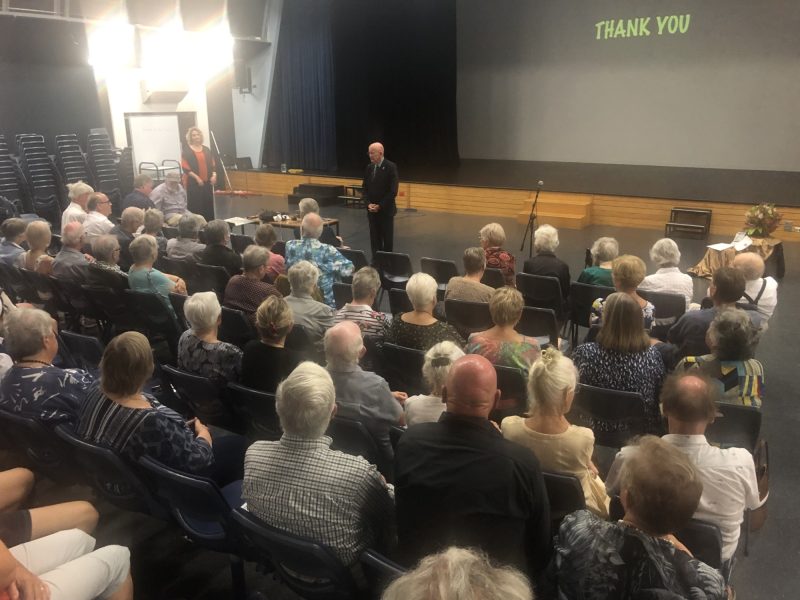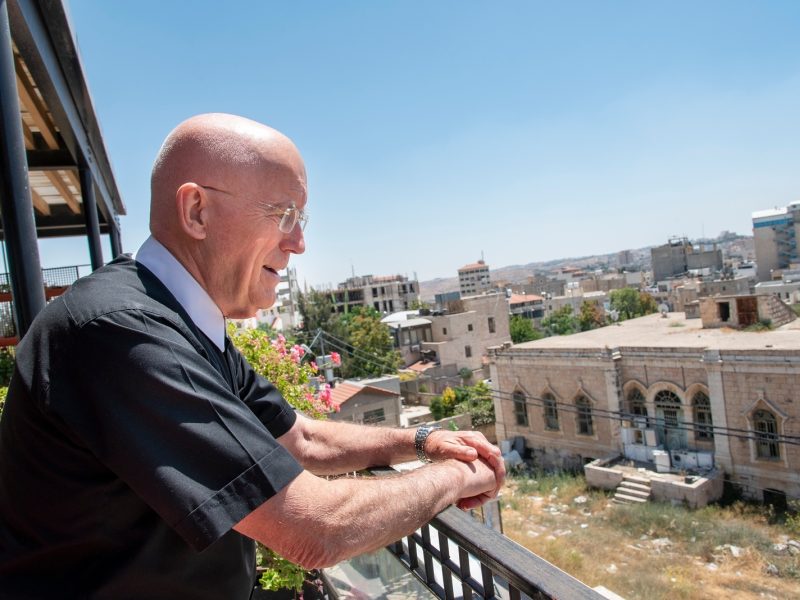Vice-Chancellor of Bethlehem University Speaks of the reality of life for Palestinians in the Holy Land
Originally from Taranaki, Br Peter Bray FSC is a De La Salle Brother who, since 2008, has been Vice-Chancellor of Bethlehem University, the only Catholic university in the Holy Land. He recently visited New Zealand and, sponsored by the New Zealand Catholic Bishops’ Conference, undertook a speaking tour of Aotearoa to raise awareness of the reality of life for Palestinians in the Holy Land.
On a wet Thursday evening in early February 2023, more than 100 people assembled in Villa Maria College’s auditorium and listened attentively to a heart-felt presentation from a Brother whose feet are firmly in the soil of Bethlehem, and whose heart is with the students of its Catholic University.

Br Peter outlined the three objectives of his talk. The first was “awareness raising.” He remains surprised at the ignorance of people around the world about what is actually happening in Palestine. The second is “friendraising.” This is the need to encourage people around the world to stand in solidarity with the Palestinian people. The third is “fund-raising”. There are 3,400 students at Bethlehem University. They contribute about 60% of its budget and then the university itself fund-raises for the remainder.
In an informative and at times, deeply moving presentation, lasting a little over an hour, Br Peter answered four key questions. He provided some context on why there is conflict in the Holy Land, the impact of that conflict on his students, how the Palestinians have responded and are resisting, and then asking us to consider how we can stand in solidarity with the Palestinian people.
While much could be written about this presentation, some key points are covered here. He called to mind that Dr Martin Luther King famously stated that “an injustice anywhere is a threat to justice everywhere.” Br Peter observed that “the number one injustice is not being treated as equals” and “if one group of people is
oppressing another group of people, that is a human rights violation.”
When I met with Br Peter prior to his presentation, I noted the intractability of this ongoing conflict. His answer:
“Apartheid was so embedded, and yet it was overturned.” He went on to cite the resolution of the troubles in Northern Ireland with the Good Friday agreement, the fall of the Berlin Wall and reunification of Germany, and the liberation of East Timor. “These are places where it just seemed impossible that peace could come and yet, each time, it happened.”

What is the impact of occupation on Palestinians? Br Peter speaks of a male student who came to him after his home, located in the West Bank, was demolished for a second time. This man responded: “They can take my house, they can take my land, they can take my freedom, but they can’t take my education.” “I’m particularly aware of the suffering that our students are experiencing in just existing, so I really admire the fact that their resistance is expressed in a non-violent way by just getting on and doing the ordinary things.”
How do Palestinians respond? “By resisting. They are masters of nonviolence. They are so restrained. Non-violence is a practical way of resisting. If there is violence, there will be push-back. Non-violent resistance means the choice to build a school, to go to school or university, to seek a profession, to cultivate your own olive
grove.” These actions “communicate that “we are not going, we are staying here, this is our land.” In summary, “to exist is to resist.” Graduating students
are encouraged to use their minds rather than weapons to challenge the occupation.”
“About half of our students come from East Jerusalem to come to Bethlehem University. Buses get stopped by the Israeli military. When they (our students) step onto campus, I want them to know they are safe, that nobody is going to interrogate them on our campus, nobody is going to arrest them on our campus, nobody is
going to put a gun in their face on our campus. It is a safe place for them.” “We are creating a little oasis of peace in the midst of all this stuff going on around them.
“When I go back to Bethlehem, I can talk to the students there about this gathering here in Christchurch. Because it is so easy for our students to get the impression that they are forgotten about. That this group at the other end of the earth, came together to hear about what’s happening in Palestine, is a significant way which we
can help keep hope alive there.
“I don’t know what it’s like to be a Palestinian under those conditions. And therefore I think it is very arrogant of me to try and tell them what they should be doing. But what I think I need to do is to be present to their pain, to be present to their suffering, and to touch their suffering with love and anoint that, to reduce that suffering into love.” “And so, I’ve got to stand in solidarity with them somehow, acknowledge and proclaim my position as a Christian, that I’m opposed to violence. I think a non-violent approach is important, but when students come to me, like this guy before I left who said “two of my friends were killed in this last month”,
I’m not sure how to respond, but I know that it is very easy to drift into revenge and hatred, and I think this is a disaster for the movement towards peace.”
I asked Br Peter about the relations between Muslims and Christians on his campus. “It is impossible for our Muslim students to be there, and not engage with Christians. There are too many of them. Most of our students from Hebron, for example, have never met a Christian until they come to Bethlehem university. A muslim from Hebron was determined to get into the faculty of Business at Bethlehem University, because it’s the best in Palestine. He struggled with the fact that it was at a Christian university. Business won out and he came. Once he was there, he realised that Christians were just ordinary people. In his last year his best friend was a Christian. He has said he doesn’t know anywhere else within Palestine where Christians and Muslims can come together like that.” And I thought he would say, “as a result, he came to understand Christians”. No, what he said was, “As a result of being there for four years, he came to appreciate Christians.” And the nuance was deliberate.
What can New Zealanders do?
1. Pray and raise awareness.
2. Give financial support.
3. Lobby against New Zealand government policies when they are contrary to justice and peace.
4. Encourage the New Zealand government to lobby other countries whose government policies are contrary to justice and peace.
But days after his visit, the Australian Catholic University (ACU) conferred an honorary doctorate on Br Peter Bray for his leadership at Bethlehem University. This award coincides with the Golden Jubilee of Bethlehem University in October 2023. He accepted the doctorate on behalf of his inspirational students. Of all his education postings, he said being Vice-Chancellor of Bethlehem University was the most difficult but also the most rewarding. “These are extraordinary young people and it is such a privilege to be involved with them.”
Written while praying for peace, justice, and equality for all peoples’ in the Holy Land.
Ken Joblin
Published in Issue 136 of Inform
